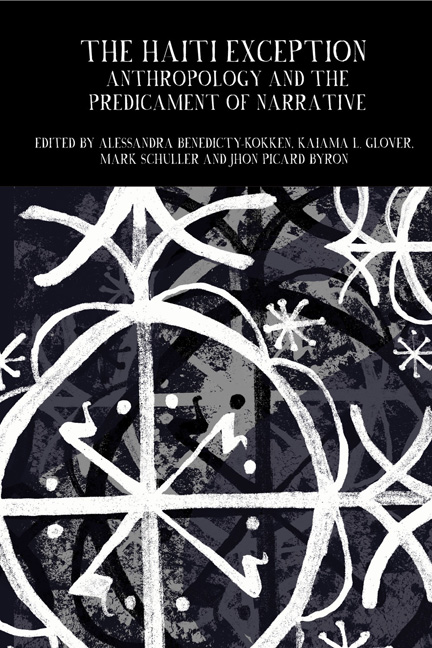Epilogue: Kalfou Danje: Situating Haitian Studies and My Own Journey within It
Summary
As the world changes, so do disciplines.
– Michel-Rolph TrouillotHaitian Studies has reached a crossroads, a crossroads at which contemporary political crises and cultural revitalization efforts demand that we remain alert to the often shifting and confounding contemporary realities of the island nation. My own work aligns with what Kwame Nimako describes as a ‘strong belief in equal opportunity and social transformation as an alternative to inequality embedded in racism’ – a commitment to ‘mass education as the basis of political mobilization and as a strategy to undo colonial indoctrination’ (Nimako, 2015: 58). Although Nimako speaks more generally about an ‘Africana intellectual tradition’, his words also describe my conviction that intellectualism, pedagogy, religious ethics and education at all levels must constantly be in conversation with each other. It is this holistic and integrated approach to research, education and activism that has shaped my career and my commitment to Haitian Studies.
I offer in this essay a series of critical reflections on the evolution of Haitian Studies over the past twenty-five years, both in Haiti and in its North American dyasporas. I reflect on my own journey, offering a narrative about my early course of study, in particular at the Faculté d'Ethnologie in Haiti, and my academic experience within the field of Black Studies, in my ‘home department’ at the University of California, Santa Barbara in the United States. As I travel back through this personal and professional past, I make connections between my scholarship on Haiti and questions of moral pedagogy and religious ethics as accessed through Vodou, connections that I have come to understand as a reawakening and call to action from within the ‘ivory tower’. Indeed, I call on the Haitian concept of the kalfou – the crossroads – to evoke the position of Haitian Studies at the junctures of history, culture, geo-politics and metaphysics, and the term danje – danger – to signal the urgent need to recognize, both in the realm of academia and in ‘real’ life, that truly understanding these junctures – or not – can either enhance our collective human experience or further diminish the lives of marginalized communities throughout the world.
- Type
- Chapter
- Information
- The Haiti ExceptionAnthropology and the Predicament of Narrative, pp. 193 - 208Publisher: Liverpool University PressPrint publication year: 2016



